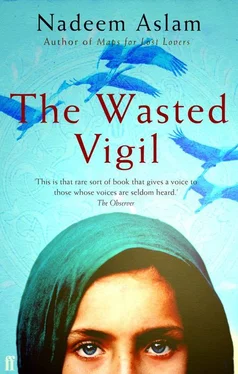Nadeem Aslam - The Wasted Vigil
Здесь есть возможность читать онлайн «Nadeem Aslam - The Wasted Vigil» весь текст электронной книги совершенно бесплатно (целиком полную версию без сокращений). В некоторых случаях можно слушать аудио, скачать через торрент в формате fb2 и присутствует краткое содержание. Год выпуска: 2009, Издательство: Faber and Faber, Жанр: Современная проза, на английском языке. Описание произведения, (предисловие) а так же отзывы посетителей доступны на портале библиотеки ЛибКат.
- Название:The Wasted Vigil
- Автор:
- Издательство:Faber and Faber
- Жанр:
- Год:2009
- ISBN:нет данных
- Рейтинг книги:4 / 5. Голосов: 1
-
Избранное:Добавить в избранное
- Отзывы:
-
Ваша оценка:
- 80
- 1
- 2
- 3
- 4
- 5
The Wasted Vigil: краткое содержание, описание и аннотация
Предлагаем к чтению аннотацию, описание, краткое содержание или предисловие (зависит от того, что написал сам автор книги «The Wasted Vigil»). Если вы не нашли необходимую информацию о книге — напишите в комментариях, мы постараемся отыскать её.
The Wasted Vigil — читать онлайн бесплатно полную книгу (весь текст) целиком
Ниже представлен текст книги, разбитый по страницам. Система сохранения места последней прочитанной страницы, позволяет с удобством читать онлайн бесплатно книгу «The Wasted Vigil», без необходимости каждый раз заново искать на чём Вы остановились. Поставьте закладку, и сможете в любой момент перейти на страницу, на которой закончили чтение.
Интервал:
Закладка:
‘I have just phoned James Palantine again,’ he tells her now. ‘He’ll be in Usha tomorrow.’
She nods. Dressed in white.
‘You know you have to be prepared for the worst?’
‘Yes.’ She is looking straight at him, unflinching, then she turns away, busying herself with some objects in an alcove. He brings home newspapers at the end of the day and she is lining the shelves with yesterday’s atrocities and small hopes. Most of her face is out of sight. Just a part of an eyebrow is visible, the dark-brown hairs that are fine like embroidery silk — a bird’s wing in flight.
‘It’s my twelfth day as Marcus’s guest.’
‘I wish I’d come to the house earlier.’
‘Marcus must feel his home is so crowded all of a sudden.’
‘He doesn’t mind.’
She turns to look at him and smiles.
He moves towards her but stops and they both look towards the door because someone is going by outside in the corridor. Though there is no need to hide anything from Marcus, they are awkward at the thought of having to reveal this to him.
Marcus had been concerned for him when — Zameen and Bihzad having disappeared from view, the Soviets having been defeated — he went back to the United States, placing telephone calls to Afghanistan, visiting, writing.
Marcus worried that he might be grieving too much for Zameen and the boy, that he wasn’t progressing with his life. Once when David mentioned a girlfriend called Angela, he was very suspicious, saying didn’t you say last time her name was Angelica.
Somewhere along the way he had picked up the ability to endure isolation. There were no lovers, only moments of love. It seemed enough. And also he was young and under the impression that — living as he now did in a secure Western country, a place whose rules he knew — he was more or less in control. But he didn’t yet know the laws of time. He thought he could waste opportunities or let them go by for now and find happiness or something close to it later. That caught up with him suddenly. A shock. Marcus was older and wiser and knew that some things can’t always be guaranteed even in peaceful lands.
When he eventually did marry, Marcus remained distrustful. Wasn’t sure whether he could believe him. The divorce four years later must have confirmed it for Marcus: David had finally decided to wrap up the fiction he had created for him.
*
As he drives through Usha he knows its people are dreading the thought that the Night Letter came from Nabi Khan, fearing a return of the days of the civil war, Nabi Khan and Gul Rasool reducing two-thirds of Usha to rubble in the early 1990s, killing a third of its population as they fought for supremacy, five hundred rockets fired into various parts of Usha in a single day. To visit certain streets was to realise that only the sky remained unchanged there.
THE BUDDHA, Marcus remembers as he approaches the stone head, had denied the existence of the soul.
It’s mid-morning and the boy is asleep at a distance from the statue, as still as an effigy.
It was here in Afghanistan that the Buddha had received a human face, the earlier representations of him having been symbols — a parasol, a throne, a footprint. A begging bowl. The Greeks in Afghanistan gave him the features of Apollo, the god of knowledge, the god who repented. The only Asian addition to Apollo was a dot on the forehead and the topknotted locks.
A meeting of continents. When he described the Muslim Paradise, Muhammad in all probability drew on the memories of the Byzantine palaces he had seen during his pre-prophethood days as a travelling merchant.
It seems that the young man has been looking at his old notebooks. Marcus picks one up from the alcove. Qatrina and Zameen and he had loved everything about books. In tissue paper, in cardboard boxes, in paper cups they would locate the scent of stationery, the odour of libraries.
He turns the pages and it all comes back. Cis-3-hexanol smells of cut grass, he recalls with a pang. How can he count the things that are now lost? To him. To this country. Are the forty-seven names by which a lover may address the beloved preserved somewhere? The tablets of etiquette. And the one vital sign, specific to each situation, which exhibits a person’s character and intentions: My friend had hesitated before entering my house, so I knew I could trust him . Does anyone recall the blue-black curls and arabesques on the water, the yards of meandering lines, when kohl floated away from the eyes of the women washing their faces at the dawn lake? And is this remembered? As though it were the moon cutting into their sleep, the men of Usha had woken one night to discover pillars of shimmering gold descending on them from the mountain range, a midnight breathing in the air as they stared at the hundred columns of light drawing near, as unnaturally real as a dream — and then the women, for it was they, approached and lifted the fronts of their burkas and revealed that the entire reverse side of each garment was studded with fireflies, one for every square inch of the fabric, the women’s skin flickering. The wives had gone away and captured these specks of frayed light and come back like living lanterns, the fluorescence streaming through the cloth. Their skin reacted provocatively wherever the wing of an insect brushed against it with any firmness, desire entering the hearts of the men at the sight. The husbands had fallen quickly asleep upon returning from the labours of the world a few hours earlier, fatigue bubbling in them like soda, the exhaustion that at times made them resent even having to drag their shadows around. And if there was anger in any of them now at having been abandoned during sleep, they remembered to check their words because they knew that a woman decides who deserves to be called a man.
Does anyone else remember that night?
There are millions of marks of love on the earth, runes and cuneiforms on the water, on the very air. It is the wisdom of a thousand Solomons. The communal script of belonging. The First Text. In a place where not many can read or write, each person’s memory is a fragile repository of song and ceremonies, tales and history, and if he vanishes without passing it on, it’s like the wing of a library burning down.
The boy stirs on the floor. For that’s what he is. A boy. Visiting the West, Marcus was always surprised to read the word ‘man’ being used to describe eighteen- or nineteen-year-olds. They are children, who, even if they may already know much about the world, know nothing about themselves yet. Won’t for many years.
‘I thought I’d have a look at your wound,’ Marcus tells him when he opens his eyes. ‘I wonder if we should change the dressing.’
‘Why do you have this idol here?’ he asks, beginning to unknot the bandage.
‘It’s always been here. It is part of Afghanistan’s past.’
He just nods in return. There is a little drowsiness in him, the result of the painkillers.
‘For a long time it never bothered anyone, for a very long time.’ The Arabs who came to fight the Soviets had called the Afghans ‘donkeys’, telling them their version of Islam was a corruption, even saying they didn’t know how to pray correctly. They fired rockets into the graves of Afghan saints. ‘People used to come and work down here, long before you were born. This was a perfume factory.’ He recalls the floor heaped with the frilly hills of roses.
‘It seems to me’, Casa says, ‘that only a bad Muslim would remain unconcerned by this thing.’ He speaks very quietly so it’s hard to detect if there is ill feeling behind what he is saying.
‘The Koran itself says that the race of djinns belonging to Solomon had decorated his cave with statues.’
‘Please don’t say such things.’ He is visibly pained.
Читать дальшеИнтервал:
Закладка:
Похожие книги на «The Wasted Vigil»
Представляем Вашему вниманию похожие книги на «The Wasted Vigil» списком для выбора. Мы отобрали схожую по названию и смыслу литературу в надежде предоставить читателям больше вариантов отыскать новые, интересные, ещё непрочитанные произведения.
Обсуждение, отзывы о книге «The Wasted Vigil» и просто собственные мнения читателей. Оставьте ваши комментарии, напишите, что Вы думаете о произведении, его смысле или главных героях. Укажите что конкретно понравилось, а что нет, и почему Вы так считаете.












